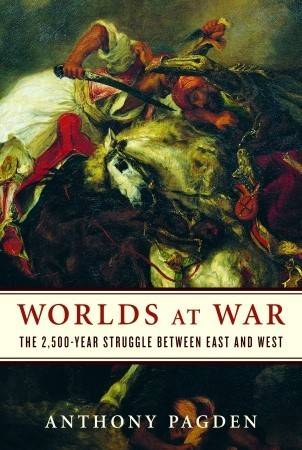

Worlds at War: The 2,500-Year Struggle Between East and West
by Anthony Pagden
Spanning two and a half millennia, Anthony Pagden’s mesmerizing Worlds at War delves deep into the roots of the “clash of civilizations” between East and West that has always been a battle over ideas, and whose issues have never been more urgent.Worlds At War begins in the ancient world, where Greece saw its fight against the Persian Empire as one between freedom and slavery, between monarchy and democracy, between individuality and the worship of men as gods. Here, richly rendered, are the crucial battle of Marathon, considered the turning point of Greek and European history; the heroic attempt by the Greeks to turn the Persians back at Thermopylae; and Salamis, one of the greatest naval battles of all time, which put an end to the Persian threat forever.From there Pagden’s story sweeps to Rome, which created the modern concepts of citizenship and the rule of law. Rome’s leaders believed those they conquered to be free, while the various peoples of the East persisted in seeing their subjects as property. Pagden dramatizes the birth of Christianity in the East and its use in the West as an instrument of government, setting the stage for what would become, and has remained, a global battle of the secular against the sacred. Then Islam, at first ridiculed in Christian Europe, drives Pope Urban II to launch the Crusades, which transform the relationship between East and West into one of competing religious beliefs.Modern times bring a first world war, which among its many murky aims seeks to redesign the Muslim world by force. In our own era, Muslims now find themselves in unwelcoming Western societies, while the West seeks to enforce democracy and its own secular values through occupation in the East. Pagden ends on a cautionary note, warning that terrorism and war will continue as long as sacred and secular remain confused in the minds of so many.Eye-opening and compulsively readable, Worlds at War is a stunning work of history and a triumph of modern scholarship. It is bound to become the definitive work on the reasons behind the age-old and still escalating struggle that, more than any other, has come to define the modern world–a book for anyone seeking to know why “we came to be the way we are.”
Release Date:
March 24, 2008

